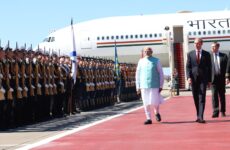Moscow,The Syrian government and its close allies in Moscow and Tehran warned Barack Obama that an offensive against Islamic State (Isis) within Syria would violate international law yesterday, hours after the US president announced that he was authorising an open-ended campaign of air strikes against militants on both sides of the border with Iraq.
Syrian opposition groups welcomed Obama’s announcement and called for heavy weapons to fight the “terror” of Isis and Bashar al-Assad. Saudi Arabia and nine other Arab states pledged to back the US plan “as appropriate”.
Hadi al-Bahra, head of the western-backed Syrian National Coalition, said the group “stands ready and willing to partner with the international community not only to defeat Isis but also rid the Syrian people of the tyranny of the Assad regime”. In Reyhanli, on the Turkish-Syrian border, a spokesman for the Free Syrian Army (FSA) said that moderate anti-Assad forces urgently needed anti-tank and anti-aircraft missiles.
But long-standing international divisions over Syria were starkly highlighed in the hours after the speech. Iran’s foreign ministry said that “the so-called international coalition to fight the Isil [Islamic State] group … is shrouded in serious ambiguities and there are severe misgivings about its determination to sincerely fight the root causes of terrorism.”
Russia said it would not support any military action without a UN resolution authorising it. “The US president has spoken directly about the possibility of strikes by the US armed forces against Isil positions in Syria without the consent of the legitimate government,” said a spokesman. “This step, in the absence of a UN security council decision, would be an act of aggression, a gross violation of international law.” China said that the world should fight terror but that national sovereignty must be respected.
In Damascus, the Assad government warned against US raids. “Any action of any kind without the consent of the Syrian government would be an attack on Syria,” said the national reconciliation minister, Ali Haidar. Analysts believe, however, that Assad would be likely to ignore strikes on Isis targets – and even seek to quietly cooperate with western efforts.
In a meeting with Staffan de Mistura, the new UN envoy for Syria, Assad stressed his commitment to fight “terrorism” but he made no mention of the US president’s speech on Wednesday night.
“As long as air strikes only hit Isis they will be condemned as a violation of international law but won’t be dealt with as aggression that requires retaliation,” Jihad Makdissi, a former Syrian diplomat, told the Guardian.
Obama used a long-heralded address on the eve of the 13th anniversary of the 9/11 attacks to lay out his response to the appearance of an aggressive jihadi insurgency in the heart of the Arab world. US polls show growing support for military action since Isis fighters captured large areas of northern Iraq and eastern Syria and beheaded two American citizens in the past month.
He compared the campaign to those waged against al-Qaida in Yemen and Somalia, where US drones, cruise missiles and special operations raids have battered local affiliates without, however, notably improving the stability of either country or dealing decisive blows.
Obama’s new strategy won swift if vague support from America’s Arab allies, with Saudi Arabia agreeing to train Syrian rebel fighters. John Kerry, the US secretary state, held talks in the port city of Jeddah with ministers from Iraq, Jordan, Lebanon, Egypt and six Gulf states. After the meeting, participants said they had agreed “as appropriate” to “many aspects” of the military campaign against Isis, to stop the flow of funds and fighters and help rebuild communities “brutalised” by the group. Support was also expressed for the new, more inclusive Baghdad government – seen as vital to persuade Iraq’s disaffected Sunnis not to support Isis. MPs in Jordan, warned, however, that they would not tolerate any participation in US action.
“We welcome this new strategy,” said Hoshyar Zebari, a Kurdish politician and one of Iraq’s newly appointed deputy prime ministers. “There is an urgent need for action. People cannot sit on the fence. This is a mortal threat to everybody.”
There was confusion over Britain’s role after Philip Hammond, the foreign secretary, said the UK would not take part in air strikes. But Downing Street quickly announced that UK participation had not been ruled out. Germany said it would not participate. Both countries have sent weapons and ammuniction to the Iraqi Kurds – part of the overall anti-Isis strategy.
The Pentagon is currently working on identifying suitable targets in Syria, according to White House officials. The US will also deploy a further 475 troops to Iraq, where they are expected to help identify targets.
US officials said that Kerry would be seeking to pressure Kuwait and Qatar to stop their citizens financing al-Qaida and Isis. The Saudis, stung by accusations of support for the jihadis, have already worked to crack down on funding and announced the arrest of scores of alleged terrorist sympathisers in recent weeks.
Obama said the air strikes were a necessary counter-terrorism measure to prevent the group from becoming a future threat to the US and therefore did not require fresh congressional approval. But he is expected to receive overwhelming congressional support for separate authorisation to provide military support to rival Syrian rebels like the FSA, a vote that some Republicans fear could help boost Democratic chances in this November’s midterm elections by providing political support for his tough new foreign policy.




 Driving Naari Programme launched in Chandigarh
Driving Naari Programme launched in Chandigarh






























